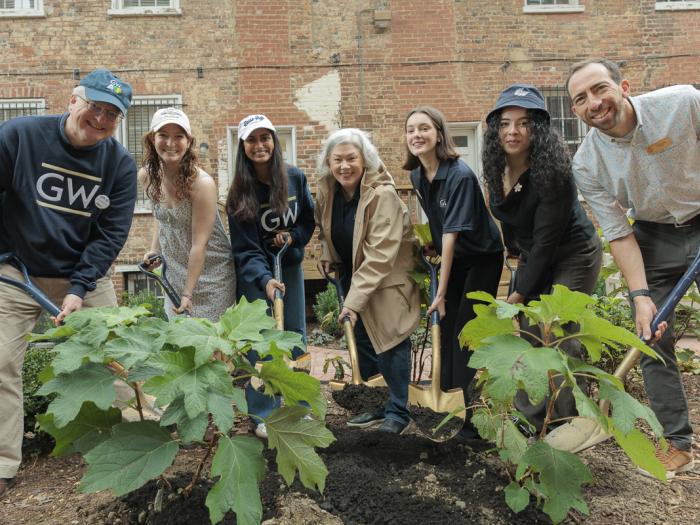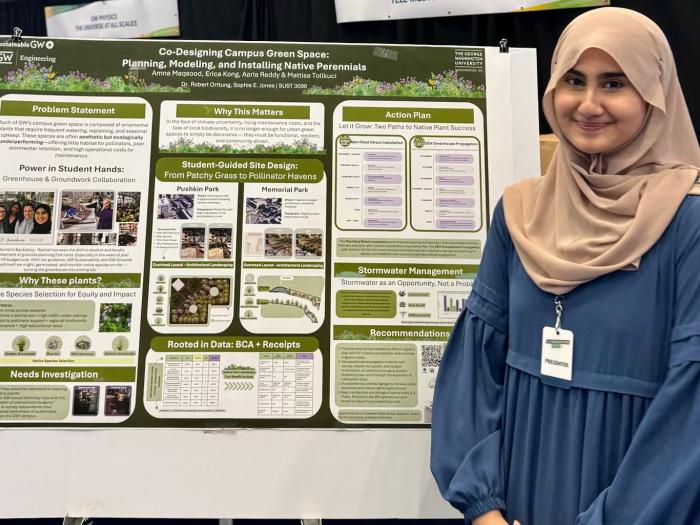Sustainability Minor & Courses
A minor with a major impact.
At the George Washington University, the Sustainability Minor is more than a line on a transcript. It's your call to action. Open to undergraduate students from any major, this interdisciplinary program prepares you with the knowledge, tools, and real-world experience to address the planet’s most urgent challenges.
Why minor in sustainability?
0
0
Your Path to a Sustainability Minor
To fulfill the requirements of the Sustainability Minor, students must complete the Introduction to Sustainability course, one course in each pillar, and a Sustainability Capstone:
| SUST 1001 - Introduction to Sustainability | |
|---|---|
| Pillar I: Sustainable Ecosystems—Earth Sciences and Public Health | Pillar II: Sustainable Economies—Business, Markets, Technology, and Trade |
| Pillar III: Sustainable Communities—Culture, Politics, and Society | Pillar IV: Sustainable Practices—Leadership, Values, Norms, and Behaviors |
| Experiential Learning Capstone | |
| SUST 3096: Research in Sustainability | SUST 3097: Culminating Experience in Sustainability |
Meet Our Faculty
Ready to Declare a Sustainability Minor?
To declare a minor in sustainability, students must fill out a minor declaration form from their school. Forms must be signed by Professor Michael Svoboda and then submitted to the student’s school advising office. Forms can be found here:
Explore ASF's Signature Courses
These interdisciplinary courses are open to students from all majors and schools. They offer hands-on learning, real-world applications, and a strong foundation in sustainability concepts. Whether you're just beginning your journey or deepening your expertise, these courses connect classroom learning with global impact.
- SUST 1001: Introduction to Sustainability
What You’ll Learn:
Whether this is your first-time studying sustainability or you have invested significant effort in sustainable endeavors, this course provides students of all backgrounds an understanding of sustainability’s goals, principles, and practical applications. We will examine major social, environmental, political, economic, and health issues and trends at community, national, and international levels from multidisciplinary perspectives. Using the United Nations Sustainable Development Goals as a framework for understanding sustainability across disciplines, we’ll see the complex relationships between human and natural resource systems, and discuss topics such as the intellectual origins of sustainability, equity, responsible consumption and production, climate change, energy use, ecosystems, public health, and more.
- SUST 2002: The Sustainable City
What You’ll Learn:
Examine how cities shape and are shaped by sustainability.
Study urban development through environmental, social, and policy lenses.
Focus on Washington, D.C. as a living lab for sustainable urban planning.What You’ll Do:
- Analyze case studies of sustainable cities.
- Propose solutions to urban sustainability challenges.
- Engage with local policy and planning efforts.
This course explores the connection between cities and sustainability. We consider sustainability from a variety of theoretical and practical perspectives and examine some of the most pressing and critical issues that must be addressed in order to create a sustainable city.
- SUST 2004: Introduction to Sustainability Communication
Students identify, examine, and critically reflect on how mass media portrays sustainability and science; evaluate and practice communication and storytelling techniques; and discern media platforms that support sustainability-related content. Recommended background: SUST 1001.
- SUST 2005: Responsible Fashion
What You’ll Learn:
- Investigate the environmental and social impacts of the fashion industry.
- Understand fast fashion and its global consequences.
- Explore ethical and sustainable alternatives.
What You’ll Do:
- Critically evaluate “green” marketing claims.
- Engage in object-based learning with The Textile Museum’s collection.
- Fulfill GW’s GPAC oral communication requirement.
Can fashion be sustainable? Is it possible to find an ethical and eco-friendly way to shop for clothing? This course turns a critical eye on the growing industry that claims to be green.
- SUST 3002: Climate Change and Policy
The relationship between climate change policy and species conservation efforts. Students explore local, national, and global perspectives on the conservation of Antarctica and its penguins. Recommended background: prior completion of SUST 1001.
- SUST 3093: Grateful Death
In folklore, the Grateful Dead motif encapsulates stories where a traveling protagonist stumbles upon a deceased stranger who has not been properly buried. After properly burying the stranger, the protagonist receives karma retribution—a person or animal embodying the deceased’s soul saves, rewards, or aids the protagonist in a significant way. This course explores deathcare practices—the planning and implementation of pre- and post-death traditions, medical services, beliefs, products, and action—around the world, reflecting on what good deaths look like and how humans can die in ways that are mindful of psychological wellbeing, human health, and ecological sustainability.
*This course is listed in the GW Bulletin as "SUST 3093: Topics in Sustainability"
- SUST 3093 / SMPP 4900: Green Business - Facts / Fictions
This course unpacks how organizations measure sustainability, revealing the difference between genuine impact and greenwashing. Through case studies, guest lectures, and real-world examples, students will learn how organizations shape the future of sustainable practices.
*This course is listed in the GW Bulletin as "SUST 3093: Topics in Sustainability"
- SUST 3093: Topics in Sustainability
Take a deep-dive into courses designed around the sustainability specialty areas of our faculty, which vary each semester! Previous titles have included:
- Environmental Ethics and Justice
- Gender and Sustainable Development
- SUST 3096: Research in Sustainability
The purpose of this course is to increase the level of sustainability on GW’s campus in concrete ways. Students work in groups to design and implement projects. Several projects have been successfully implemented in the past. Students design and present a poster on their research at the end of semester’s Sustainability Minor Poster Session Celebration. Prerequisites: SUST 1001.
- SUST 3097: Culminating Experience in Sustainability
Making the shift from successful college student to a competent, early career professional is a process that can be learned. This course helps you develop your professional skills, brand, network, and deliverables. You will demonstrate your progress in your culminating project and in your subsequent professional experiences—whether that is securing your first job out of college, finding an internship or volunteering experience, applying for graduate school, conducting research, or building your network to start your own business. Students conduct a 60-hour paid or unpaid internship, fieldwork, research project, or community service that addresses a sustainability challenge and benefits a community, organization, or group. Students design and present a poster on their project at the end of semester’s Sustainability Minor Poster Session Celebration.
Student Research
Sustainability Minors are involved in research, hands-on learning, fieldwork, publishing, and more. See how our students are turning their passion for sustainability into real-world impact.

Sustainability Capstone Students Help to Transform Campus
September 20, 2025

Turning the Urban Landscape into Greenspace
July 9, 2025
Ready to Take Action?
These courses are more than academic—they’re a launchpad for leadership in sustainability. Enroll through the GW course registration system and start building your impact today.






